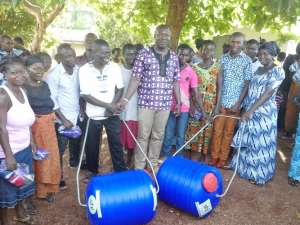
Cholera is an acute infectious disease caused by a bacterium, Vibro Cholerae which results in a painless, watery diarrhea in humans. Some affected individuals have copious amounts of diarrhea and develop dehydration so severe that, it can lead to death.
Most people who get the disease ingest the organisms through food or water sources contaminated with Vibrio cholerae. Although symptoms may be mild, some healthy people will develop a copious diarrhea within one to five days after ingesting the bacteria. Severe disease requires prompt medical care.
The Medical Superintendent of Chirano Gold Mines Limited, Dr. Alex Nana Djan, mentioned these during a cholera education organized by Sefwi Health Initiative at Sefwi Anyinasie on November 23, 2014.
He explained that, the symptoms and signs of cholera are a watery diarrhea that often contains flecks of whitish material that are about the size of pieces of rice. The diarrhea is termed "rice-water stool "and smells "fishy".
He added that, people may go on to develop one or more of the following symptoms and signs: Vomiting, rapid heart rate, loss of skin elasticity, low blood pressure, thirst, muscle cramps and restlessness. Those infected require immediate hydration to prevent these symptoms from continuing because these signs and symptoms indicate that the person is becoming or is dehydrated and may go on to develop severe cholera.
Preliminary diagnosis is usually done by a caregiver who takes a history from the patient and observes the characteristic rice-water diarrhea, especially if an outbreak of cholera has been identified he said. The diarrhea fluid is often teeming with motile, comma-shaped bacteria that can be seen with an optical microscope.
Also, he added that,diagnosis helps to distinguish cholera from other diseases caused by other bacterial, protozoa or viral pathogens that cause dysentery.
Dr. Alex said if cholera untreated can lead to dehydration and severe dehydration can rapidly lead to shock and death. Severe dehydration can often occur four to eight hours after the first liquid stool, ending with death in about 18 hours to a few days in undertreated or untreated people.
Everyone is susceptible to choleraand certain factors can make you more vulnerable to the disease. The risk factors for cholera include: poor sanitary conditions,sick household members and eating unhygienic food.
Cholera can be prevented by several methods. Developed countries have an almost zero incidence of cholera because they have widespread water-treatment plants, food-preparation facilities that usually practice sanitary protocols and most people have access to toilets and hand-washing facilities he said.
Individuals can prevent or reduce the chance of getting cholera by thorough hand washing with soap and running water, avoiding areas and people with cholera, drinking treated water and eating wellcooked hot food and keeping flies away from food.
Here's a helpful saying: "Boil it, cook it, peel it, or forget it!" he said.
Listeners who were already at the venue of the education were given coupons to enter into SHI Lucky draw before the commencement of the programme. At the end of the draw, two lucky winners, Matthew Oppong and Ruth Obeng both took away a hippo roller which was the ultimate prize. The remaining winners got themselves T-Shirts and SHI wrist bands.
Joseph William Anyan
Community Programme Coordinator
 20141123 161258
20141123 161258




 We’ll no longer tolerate your empty, unwarranted attacks – TUC blasts Prof Adei
We’ll no longer tolerate your empty, unwarranted attacks – TUC blasts Prof Adei
 Bawumia donates GHc200,000 to support Madina fire victims
Bawumia donates GHc200,000 to support Madina fire victims
 IMF to disburse US$360million third tranche to Ghana without creditors MoU
IMF to disburse US$360million third tranche to Ghana without creditors MoU
 Truck owner share insights into train collision incident
Truck owner share insights into train collision incident
 Paramount chief of Bassare Traditional Area passes on
Paramount chief of Bassare Traditional Area passes on
 Two teachers in court over alleged illegal possession of BECE papers
Two teachers in court over alleged illegal possession of BECE papers
 Sunyani: Victim allegedly shot by traditional warriors appeals for justice
Sunyani: Victim allegedly shot by traditional warriors appeals for justice
 Mahama vows to scrap teacher licensure exams, review Free SHS policy
Mahama vows to scrap teacher licensure exams, review Free SHS policy
 Government will replace burnt Madina shops with a new three-story, 120-store fac...
Government will replace burnt Madina shops with a new three-story, 120-store fac...
